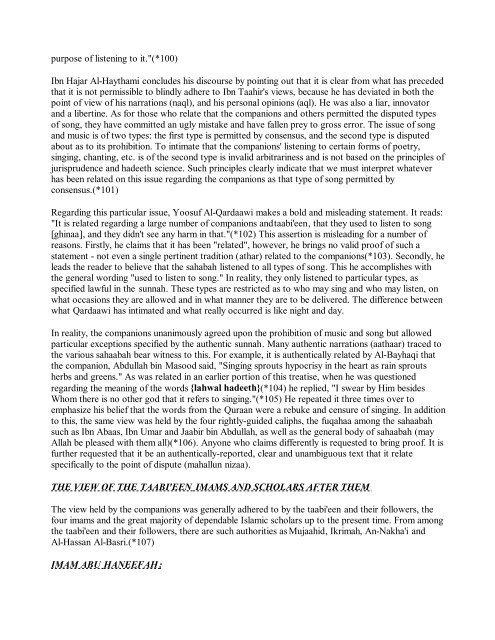The Islamic Ruling on Music and Singing - Enjoy Islam
The Islamic Ruling on Music and Singing - Enjoy Islam
The Islamic Ruling on Music and Singing - Enjoy Islam
You also want an ePaper? Increase the reach of your titles
YUMPU automatically turns print PDFs into web optimized ePapers that Google loves.
purpose of listening to it."(*100)<br />
Ibn Hajar Al-Haythami c<strong>on</strong>cludes his discourse by pointing out that it is clear from what has preceded<br />
that it is not permissible to blindly adhere to Ibn Taahir's views, because he has deviated in both the<br />
point of view of his narrati<strong>on</strong>s (naql), <strong>and</strong> his pers<strong>on</strong>al opini<strong>on</strong>s (aql). He was also a liar, innovator<br />
<strong>and</strong> a libertine. As for those who relate that the compani<strong>on</strong>s <strong>and</strong> others permitted the disputed types<br />
of s<strong>on</strong>g, they have committed an ugly mistake <strong>and</strong> have fallen prey to gross error. <str<strong>on</strong>g>The</str<strong>on</strong>g> issue of s<strong>on</strong>g<br />
<strong>and</strong> music is of two types: the first type is permitted by c<strong>on</strong>sensus, <strong>and</strong> the sec<strong>on</strong>d type is disputed<br />
about as to its prohibiti<strong>on</strong>. To intimate that the compani<strong>on</strong>s' listening to certain forms of poetry,<br />
singing, chanting, etc. is of the sec<strong>on</strong>d type is invalid arbitrariness <strong>and</strong> is not based <strong>on</strong> the principles of<br />
jurisprudence <strong>and</strong> hadeeth science. Such principles clearly indicate that we must interpret whatever<br />
has been related <strong>on</strong> this issue regarding the compani<strong>on</strong>s as that type of s<strong>on</strong>g permitted by<br />
c<strong>on</strong>sensus.(*101)<br />
Regarding this particular issue, Yoosuf Al-Qardaawi makes a bold <strong>and</strong> misleading statement. It reads:<br />
"It is related regarding a large number of compani<strong>on</strong>s <strong>and</strong> taabi'een, that they used to listen to s<strong>on</strong>g<br />
[ghinaa], <strong>and</strong> they didn't see any harm in that."(*102) This asserti<strong>on</strong> is misleading for a number of<br />
reas<strong>on</strong>s. Firstly, he claims that it has been "related", however, he brings no valid proof of such a<br />
statement - not even a single pertinent traditi<strong>on</strong> (athar) related to the compani<strong>on</strong>s(*103). Sec<strong>on</strong>dly, he<br />
leads the reader to believe that the sahabah listened to all types of s<strong>on</strong>g. This he accomplishes with<br />
the general wording "used to listen to s<strong>on</strong>g." In reality, they <strong>on</strong>ly listened to particular types, as<br />
specified lawful in the sunnah. <str<strong>on</strong>g>The</str<strong>on</strong>g>se types are restricted as to who may sing <strong>and</strong> who may listen, <strong>on</strong><br />
what occasi<strong>on</strong>s they are allowed <strong>and</strong> in what manner they are to be delivered. <str<strong>on</strong>g>The</str<strong>on</strong>g> difference between<br />
what Qardaawi has intimated <strong>and</strong> what really occurred is like night <strong>and</strong> day.<br />
In reality, the compani<strong>on</strong>s unanimously agreed up<strong>on</strong> the prohibiti<strong>on</strong> of music <strong>and</strong> s<strong>on</strong>g but allowed<br />
particular excepti<strong>on</strong>s specified by the authentic sunnah. Many authentic narrati<strong>on</strong>s (aathaar) traced to<br />
the various sahaabah bear witness to this. For example, it is authentically related by Al-Bayhaqi that<br />
the compani<strong>on</strong>, Abdullah bin Masood said, "<strong>Singing</strong> sprouts hypocrisy in the heart as rain sprouts<br />
herbs <strong>and</strong> greens." As was related in an earlier porti<strong>on</strong> of this treatise, when he was questi<strong>on</strong>ed<br />
regarding the meaning of the words {lahwal hadeeth}(*104) he replied, "I swear by Him besides<br />
Whom there is no other god that it refers to singing."(*105) He repeated it three times over to<br />
emphasize his belief that the words from the Quraan were a rebuke <strong>and</strong> censure of singing. In additi<strong>on</strong><br />
to this, the same view was held by the four rightly-guided caliphs, the fuqahaa am<strong>on</strong>g the sahaabah<br />
such as Ibn Abaas, Ibn Umar <strong>and</strong> Jaabir bin Abdullah, as well as the general body of sahaabah (may<br />
Allah be pleased with them all)(*106). Any<strong>on</strong>e who claims differently is requested to bring proof. It is<br />
further requested that it be an authentically-reported, clear <strong>and</strong> unambiguous text that it relate<br />
specifically to the point of dispute (mahallun nizaa).<br />
THE VIEW OF THE TAABI'EEN IMAMS AND SCHOLARS AFTER THEM<br />
<str<strong>on</strong>g>The</str<strong>on</strong>g> view held by the compani<strong>on</strong>s was generally adhered to by the taabi'een <strong>and</strong> their followers, the<br />
four imams <strong>and</strong> the great majority of dependable <str<strong>on</strong>g><strong>Islam</strong>ic</str<strong>on</strong>g> scholars up to the present time. From am<strong>on</strong>g<br />
the taabi'een <strong>and</strong> their followers, there are such authorities as Mujaahid, Ikrimah, An-Nakha'i <strong>and</strong><br />
Al-Hassan Al-Basri.(*107)<br />
IMAM ABU HANEEFAH :

















